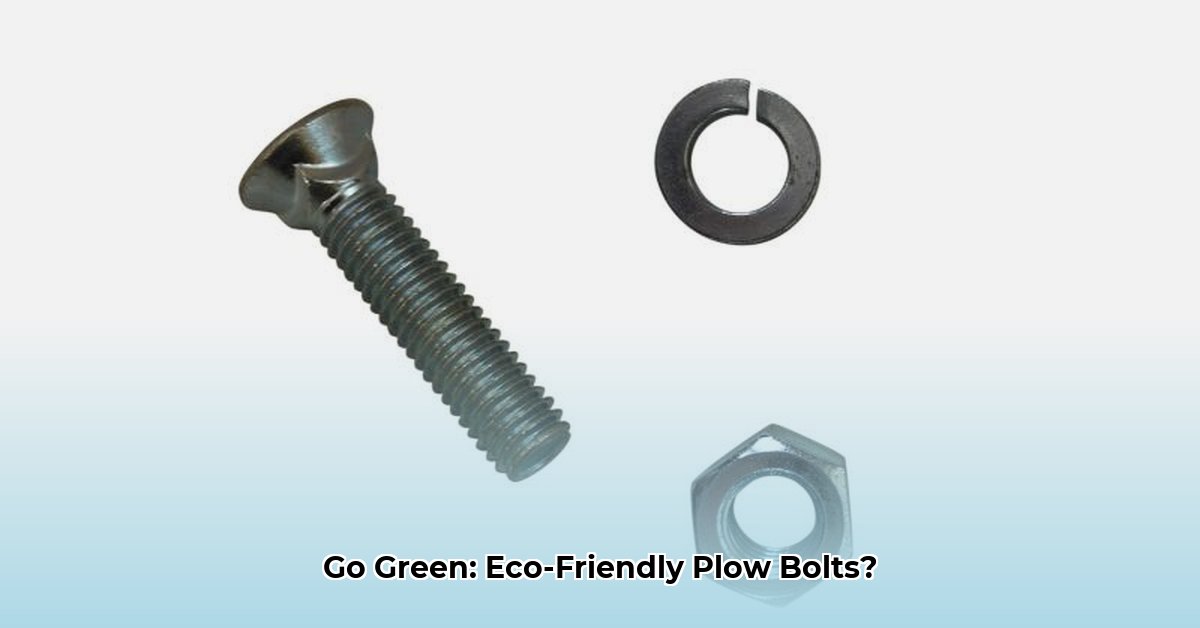
Sustainable farming practices extend beyond innovative techniques; they encompass seemingly minor details, such as the selection and maintenance of plow bolts. This guide explores how choosing the right plow bolts from Tractor Supply can significantly impact your farm's efficiency and environmental footprint. These often-overlooked metal fasteners play a pivotal role in your farm's overall success and its sustainability. For more on sustainable gardening supplies, check out this helpful resource: Tractor Supply Resources.
Choosing the Right Plow Bolts: Durability and Longevity
Plow bolts are the workhorses of your tillage equipment. Their strength and lifespan directly influence your farm's productivity. Frequent replacements lead to downtime, increased labor costs, and a larger carbon footprint due to increased manufacturing and transportation. Therefore, selecting the right bolts is crucial.
Material Selection: High-quality, hardened steel bolts offer superior durability. While the initial cost is higher, the reduced replacement frequency translates to significant long-term savings. Look for materials with high tensile strength (a measure of a material's resistance to breaking under tension) to withstand the harsh conditions of plowing.
Size and Threading: Precise size and thread type matching your equipment is paramount. Incorrect bolts cause premature wear and potential equipment damage. Consult your owner's manual for specifications.
Supplier Reliability: Reliable suppliers, such as Tractor Supply, provide quality products suitable for agricultural use. They typically offer a range of options, ensuring you find a balance between cost and longevity.
Minimizing Your Farm's Environmental Impact
Sustainable agriculture prioritizes environmentally friendly practices. Your plow bolt choices directly affect your farm's environmental impact:
Material Sourcing: Prioritize bolts made from recycled steel, which drastically reduces the environmental burden of steel mining.
Manufacturing Processes: Investigate the manufacturer's production methods. Look for companies employing energy-efficient processes and minimizing waste.
End-of-Life Management: Consider the disposal of worn-out bolts. Choosing recyclable materials and properly disposing of them minimizes environmental impact.
Optimizing Bolt Lifespan: Preventative Maintenance
Preventative maintenance significantly extends the lifespan of your plow bolts:
Regular Inspections: Regularly inspect bolts for wear, corrosion, or damage. Tighten loose bolts immediately to prevent further issues.
Lubrication: Apply a suitable lubricant to prevent corrosion and seizing, significantly increasing bolt lifespan and reducing the risk of failure.
Scheduled Replacements: Develop a replacement schedule based on expected wear and tear. Proactive replacement prevents unexpected breakdowns and potential equipment damage.
Comparing High-Quality and Lower-Quality Plow Bolts
While high-quality plow bolts have a higher initial cost, the long-term benefits are substantial.
| Feature | High-Quality Bolts | Lower-Quality Bolts |
|---|---|---|
| Initial Cost | Higher | Lower |
| Durability | Significantly higher | Lower; more frequent replacements |
| Downtime | Minimized | Increased due to breakdowns |
| Labor Costs | Reduced | Increased due to repairs |
| Environmental Impact | Lower (fewer replacements) | Higher (more replacements) |
| Total Cost of Ownership | Often lower in the long run | Often higher in the long run |
Smart purchasing from Tractor Supply and implementing preventative maintenance strategies offer significant, long-term benefits.
Sustainable Plow Bolt Materials: A Deeper Dive
The sustainability of plow bolts depends heavily on the materials used. Let's examine some common options:
Steel: Widely used due to strength and cost-effectiveness. However, steel production is energy-intensive, and disposal presents challenges. Recycling steel bolts is crucial for sustainability.
Stainless Steel: Offers superior corrosion resistance, extending the lifespan and reducing the need for frequent replacements. The higher upfront cost is balanced by its longevity and reduced environmental impact.
Recycled Steel: Using recycled steel significantly minimizes the environmental burden associated with steel production. Supporting this practice encourages manufacturers to adopt more sustainable practices.
Emerging Materials: Research into bio-based composites and other materials with enhanced corrosion resistance holds promise for future improvements in eco-friendliness.
Expanding Sustainable Practices: A Holistic Approach
Choosing sustainable materials is just the beginning. A holistic approach to sustainable farming includes:
Regular Inspections: Early detection of wear and tear prevents premature failures and minimizes waste.
Proper Installation: Following manufacturer instructions ensures optimal performance and extends bolt life. Avoid over-tightening, a common cause of bolt failure.
Smart Maintenance: Preventative maintenance reduces unnecessary replacements, positively impacting both cost and environmental impact.
Responsible Recycling: Properly recycling old bolts conserves resources and prevents landfill waste.
Lifecycle Assessment: A Comprehensive Perspective
The environmental impact of a plow bolt extends beyond its initial production. A lifecycle assessment considers:
- Manufacturing: Energy consumption, emissions, and waste generation during production.
- Transportation: Fuel consumption and emissions during shipment.
- Use: The bolt's performance and lifespan during operation.
- Disposal/Recycling: The environmental impact of discarding or recycling the bolt.
Understanding this lifecycle is key to making informed purchasing decisions.
Sustainable Farming: A Collective Effort
Sustainable farming demands a holistic approach. Choosing eco-friendly materials, employing proper maintenance, and responsibly managing waste contribute to a sustainable agricultural future. The seemingly insignificant details, like plow bolts, collectively impact the overall sustainability of your farming practices. It's about making a positive impact, one bolt at a time.
Key Takeaways:
- Prioritize recycled materials when selecting plow bolts.
- Implement regular inspections and preventative maintenance.
- Consider the entire lifecycle of plow bolts (from production to disposal).
- Support the development and adoption of eco-friendly bolt materials.